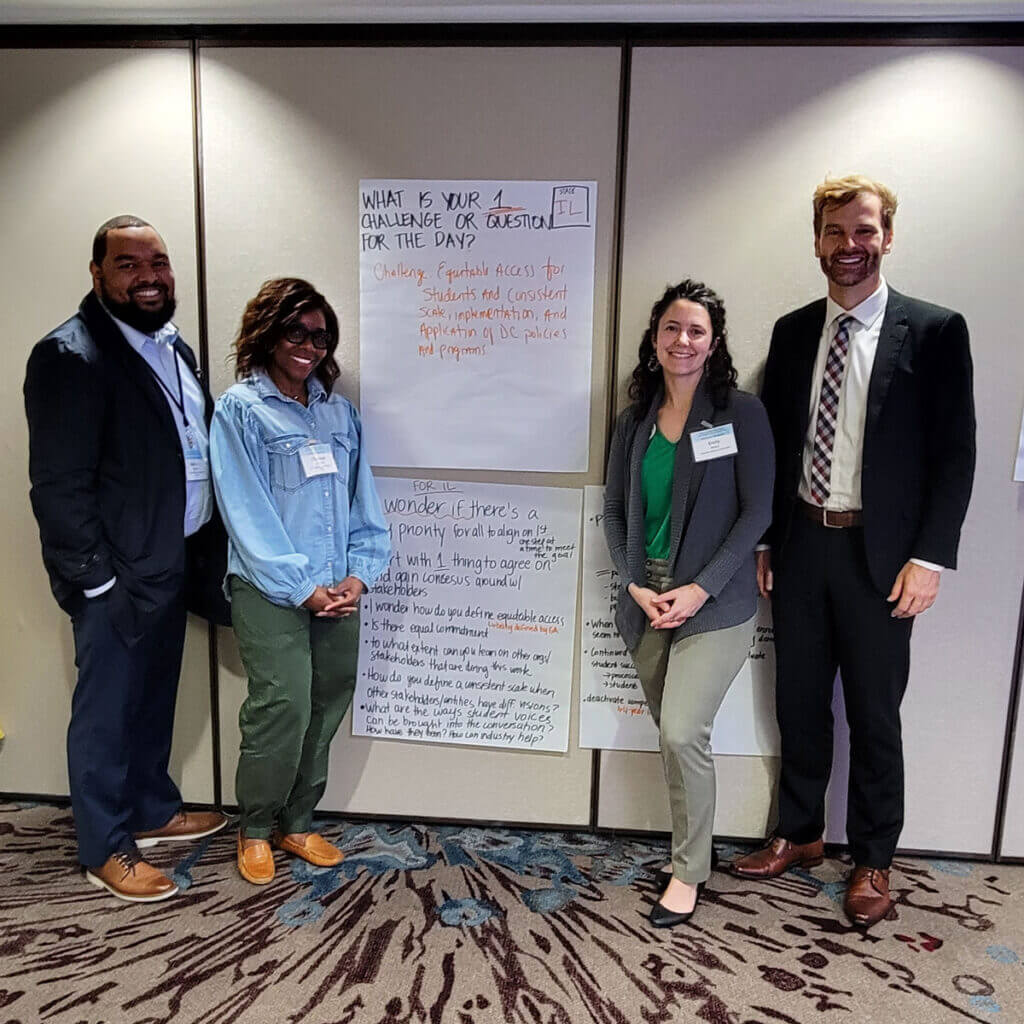At the State Dual Enrollment Academy on September 27, 2023, the Illinois team learned about developing equitable student supports and shared our state’s extensive work to promote intentional dual credit experiences for students through aligned policy.
Why Attend a State Dual Enrollment Academy?
National partners College in High School Alliance (CHSA) and Jobs for the Future (JFF) convened state teams through the State Dual Enrollment Academy as a valuable peer-to-peer learning opportunity, where states hear from one another about their challenges and innovations in policy and practice. In particular, the Academy provided a space to examine state strategies and hear from experts in the field on how to use policy to promote intentional offerings and equitable student support. We then participated in team time to strategize around Illinois’ dual credit challenges, with opportunities to share and collaborate with partners from other states.

The academy was split into two tracks, with Illinois representation at both. In the first track, Promoting Intentional Dual Enrollment Through Policy, we had the opportunity to share the good work that has been done over the years to promote intentional dual credit implementation through policy. In the second track, Supporting Student Success in Dual Enrollment Through Policy, the Illinois team, composed of Josh Stafford (superintendent, Vienna High School), Melvin Harrison (director for academic affairs, ICCB), and Charmell McGhee (principal consultant, ISBE), learned about models for student supports that can be driven at the statewide level. Students, families, and practitioners highlighted the importance of student support as a strategy to ensure equitable access and outcomes in the 2021 Illinois Dual Credit Survey, and the team was eager to learn from partners in Texas, Arizona, and at the National Alliance for Concurrent Enrollment Partnerships about promising support strategies like dual advising models.
Overall, the team had a full day of learning and came away with many ideas about continuing to support communities across Illinois to implement quality dual credit programming and leverage the strong policies in place to ensure it is done with an eye toward equity and long-term student success.
What Did We Share?
Promoting Intentional Dual Credit Across Policy & Promoting it in Practice
Illinois stands out for its efforts to promote intentional dual credit through a range of policy windows. At the State Dual Enrollment Academy, we shared some of the critical strategies and highlights from that extensive work in Illinois.
- Clarify what “intentional” means.
One of the core reasons for offering dual credit is to accelerate students to postsecondary success, but this requires attention to the courses being offered. In Illinois, we have worked to avoid “random acts” of dual credit that will not necessarily help a student progress along a postsecondary pathway. As such, the state prioritizes intentional dual credit that falls into two primary categories: core academic coursework (particularly math, English, and courses aligned with the Illinois Articulation Initiative) and career-focused courses that serve as “door openers” for programs of study at the postsecondary level (e.g. Medical Terminology for healthcare pathways).
- Promote intentional dual credit across all possible policy windows.
A core strategy to drive aligned policy implementation is to reinforce the same principle across as many relevant policy windows as possible. In the case of intentional dual credit, this includes defining and incentivizing this approach through the Dual Credit Quality Act Model Partnership Agreement, the College and Career Pathway Endorsements framework, the state Perkins plan, and the ESSA College and Career Readiness Indicator in particular. Across each of these frameworks, intentional dual credit is promoted through either prioritizing those types of courses or by defining readiness through successful completion of them. In this way, districts and schools are encouraged to prioritize strategic dual credit for their students.
- Provide resources and tools to support practitioners in identifying and delivering intentional dual credit.
While the policy frameworks defined above provide encouragement to the field to offer intentional dual credit, practitioners across secondary districts and buildings benefit from concrete tools and strategies that enable them to implement with fidelity in service of student success. The State of Illinois Model Programs of Study Guides we published with ICCB support are a prime example of what it looks like to identify and sequence strategic dual credit coursework within a student’s pathway. In particular, we highlighted the process by which we identified programs of study at the postsecondary level, obtained curricula, and identified the most strategic courses to consider offering as early college credit. Attendees from other states were eager to learn about how something as simple as a spreadsheet tool could enable them to identify intentional dual credit opportunities for their students at a regional or even statewide level.
What Did We Learn?
One exciting learning was seeing how our Model Program of Study Guides have inspired work elsewhere. Shannon Cox, Superintendent of the Montgomery County Education Service Center in Ohio, shared work through their Business Advisory Council to map model pathways through a process inspired by our Illinois guides.
The Illinois state team identified a number of learnings coming out of attending the Academy:
- We aren’t alone in facing challenges around scaling dual credit, particularly in communities where resources and partnerships may be constrained.
- Robust policy frameworks are valuable, but implementation with an eye toward fidelity and equity can be challenging to achieve.
- Statewide supports in the field are needed to make good on the promise of open policy windows, including raising awareness of things like the DCQA MPA.
- Tools like the Model Program of Study Guides and the related processes are valuable as they illustrate the concrete steps it takes to plan for and offer intentional dual credit opportunities for students.
Though we can celebrate the great work that has been done to establish robust policy frameworks, we will continue working with community partners and policymakers to identify strategies to ensure those policies are implemented with fidelity and in ways that drive equitable access to dual credit. We hope to see strategies to scale intentional dual credit and equitable student support through ICCB’s recent appropriation to fund dual credit work and ongoing work to implement HB3296/Public Act 102-0917.


